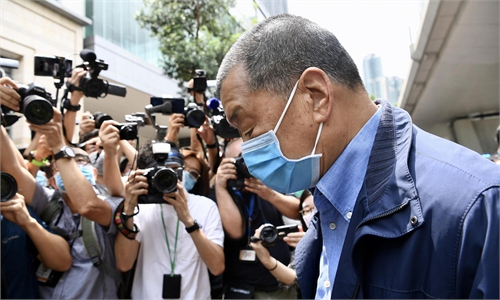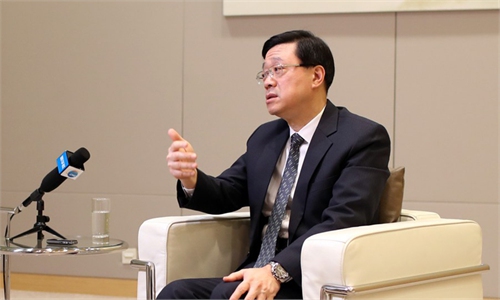Jimmy Lai gets 14 more months for illegal assembly, a further signal of clear, independent HK judicial system free of foreign interferences

Jimmy Lai File. Photo: AFP
Hong Kong media tycoon Jimmy Lai Chee-ying was sentenced 14 months in prison on Friday alongside nine others, including several former district councilors, for taking part in illegal assembly on October 1, 2019, one day after Hong Kong Special Administrative Region (HKSAR) finalized local amendments for election overhaul.
The case, as well as two other illegal assembly cases that had already earned Lai 14 months in jail in mid-April, was handled within the framework of Hong Kong's local ordinances. Some observers saw a clearer judicial environment in the city that is conducive to guarantee that people involved in activities disrupting social orders will be punished by law.
Lai was involved in three instances of illegal assembly in total which all have been sentenced. He also bears a fraud charge that is scheduled to be trialed in March 2022 and two cases under the national security law for Hong Kong, namely conspiracy to collude with foreign countries or forces to endanger national security, and conspiracy to do one or a series of acts to pervert the course of justice.
The two security cases are subject to a further hearing at the West Kowloon Court until June 15.
Among 9 other defendants of the Friday case, "longhair" Leung Kwok-hung, Ho Chun-Yan and Lee Cheuk-yan, three former district councilors, were sentenced to 18 months in prison. Others face prison terms from 14 to 18 months.
Hong Kong public welcome this judgment as it appropriately reflected the gravity of Lai's illegal conduct, Lawrence Ma, barrister and chairman at Hong Kong Legal Exchange Foundation, told the Global Time on Friday.
Foreign media have focused their lenses on Lai via the angle of "fall of freedom of speech," but Chinese observers made it clear that current sentences were only about his conducts in violation of local ordinances while the national security law charges are still under determination.
Indeed the "freedom of speech" has so long been abused as an excuse to indulge secessionists and their supporters' illegal activities, Li Xiaobing, an expert on Hong Kong, Macao and Taiwan, from Nankai University, told the Global Times.
Observers also pointed out that though the illegal assembly cases were dealt independently from the national security law cases, clear judicial and political standards are necessary to hold those acting outside the law to account.
It is too early to judge how the cases (concerning national security law for Hong Kong) will be decided, but they will be the core parts in comparison to the already pronounced sentences, Li said.
Lai was found to use his Next Digital and personal accounts to sponsor riot activities, with suspected funding from foreign forces.
The Hong Kong Security Bureau froze Lai's shares in his Next Digital media company and his other bank assets on May 14 under the article 43 of national security law for Hong Kong, which was estimated to be worth more than HK$300 million ($38.6 million).
Hong Kong authorities have warned HSBC and Citi Bank that they may commit violation of national security law for Hong Kong if they deal with Lai's frozen assets, Reuters reported Thursday.
Given the background, Ma also noted the court has sent a clear message that a traitor will be punished no matter how vigorous foreign adversarial forces are in agitating for release, noting Hong Kong has a strong independent judiciary to uphold the law and is fully capable of fending away any foreign political influence.
Foreign forces which seek to use Hong Kong as a proxy to stir up trouble for China should abandon their illusion as their agents in the city will face legal punishment, experts said.



